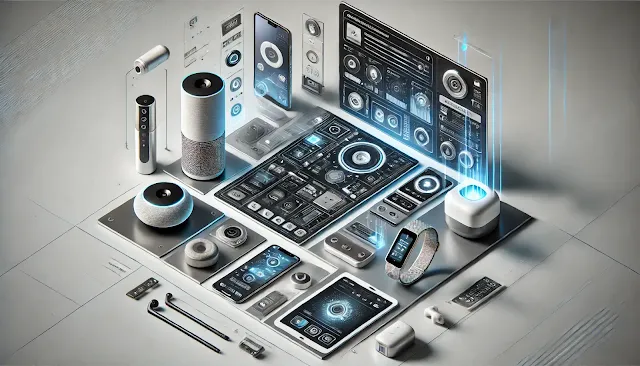Technology has become an integral part of our lives, influencing everything from how we communicate to how we work and even how we manage our daily routines. In recent years, advancements in technology have accelerated, introducing groundbreaking innovations that promise to redefine our future. Let’s explore some of the most exciting trends that are transforming industries and enhancing our lifestyles.
1. AI-Powered Smart Homes: Redefining Comfort and Efficiency
The concept of smart homes is no longer a futuristic dream—it’s becoming a reality for many. AI-powered devices are revolutionizing the way we interact with our living spaces. Smart thermostats can learn your daily routines and automatically adjust the temperature to maximize comfort and energy efficiency. Voice-activated assistants like Amazon Alexa and Google Assistant are not just about setting timers anymore; they’re integrated into our daily lives, helping with grocery lists, controlling smart appliances, and even managing home security.
For instance, advanced AI-driven security cameras now use facial recognition to differentiate between family members, guests, and potential intruders. Smart lighting systems can mimic your presence when you’re away, offering an extra layer of security. These technologies not only make life more convenient but also contribute to reducing energy consumption and carbon footprints.
2. Holographic Smartphones: A New Dimension of Interaction
The smartphone industry continues to innovate, and holographic technology is the latest game-changer. Imagine projecting a 3D image of a friend during a video call or viewing holographic instructions for assembling furniture right in your living room. This is the promise of holographic smartphones, which use advanced projection and sensor technology to bring virtual content to life.
These devices are particularly exciting for industries like gaming, where players can experience fully immersive 3D worlds, and healthcare, where holograms can assist in complex surgeries. The entertainment industry is also set to benefit, offering next-level experiences in AR and VR applications. As these devices become more accessible, they will undoubtedly change how we interact with technology.
3. Wearable Health Tech: Empowering Personal Health Management
Wearable technology has evolved far beyond basic fitness trackers. Today’s health wearables are equipped with advanced sensors capable of monitoring vital signs, including heart rate variability, oxygen saturation, and even glucose levels for diabetic patients. These devices provide real-time data that can be synced with health apps and shared with medical professionals.
Some wearable devices use AI to analyze sleep patterns, offering suggestions to improve rest and recovery. Others, like smart rings, can detect early signs of illnesses by monitoring subtle changes in body temperature and other metrics. These advancements empower individuals to take control of their health, enabling preventive care and reducing the burden on healthcare systems.
4. Advanced Robotics: From Factories to Everyday Life
Robots are no longer confined to industrial settings. Thanks to AI and machine learning, robots are becoming more versatile, stepping into roles that require precision, consistency, and even creativity. In customer service, humanoid robots are being deployed to handle routine queries, freeing up human staff for more complex interactions.
At home, robotic vacuum cleaners, lawn mowers, and even personal assistants are becoming common. In healthcare, surgical robots are assisting doctors with highly intricate procedures, increasing success rates and reducing recovery times. The possibilities are endless, and as robotics technology improves, its applications will expand into new domains.
5. Green Tech: Innovating for a Sustainable Future
As the world grapples with climate change, the tech industry is playing a crucial role in driving sustainability. Innovations in green technology aim to reduce waste, conserve energy, and minimize environmental impact. Solar-powered gadgets, energy-efficient appliances, and AI systems that optimize energy usage are becoming mainstream.
For example, smart grids use AI to balance electricity supply and demand, reducing wastage and integrating renewable energy sources more effectively. Electric vehicles (EVs) are another major innovation, with advancements in battery technology making them more affordable and efficient. Green tech is not just a trend; it’s a necessity, and the tech world is leading the charge toward a more sustainable future.
6. Quantum Computing: Unlocking New Possibilities
Quantum computing, once confined to research labs, is making strides toward commercial applications. These supercomputers leverage the principles of quantum mechanics to process information exponentially faster than traditional computers. From solving complex mathematical problems to optimizing supply chains, quantum computing has the potential to revolutionize industries like finance, healthcare, and logistics.
For instance, pharmaceutical companies are using quantum computers to simulate molecular interactions, speeding up drug discovery. In cybersecurity, quantum encryption promises unparalleled data protection, safeguarding sensitive information in an increasingly digital world.
Conclusion: A Glimpse into Tomorrow
The pace of technological innovation shows no signs of slowing down. From AI-powered smart homes to wearable health devices and quantum computing, these advancements are not just enhancing our lives—they’re reshaping the way we think about the future. As these technologies continue to evolve, they will open up new opportunities, solve pressing global challenges, and bring us closer to a smarter, more connected world.
Stay informed and inspired as we witness these exciting changes unfold. The future of technology is here, and it’s nothing short of extraordinary.


